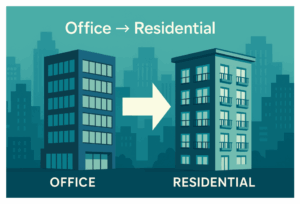Introduction
The recent changes in Airbnb regulations in New York City have sent ripples through the commercial real estate sector. With Local Law 18 coming into effect, the landscape for short-term rentals has changed dramatically. In this blog post, we’ll explore the implications of these new regulations for commercial real estate. At Renew Realty, we keep our finger on the pulse of real estate trends to provide you with the most accurate and actionable insights.
The New Regulations: A Brief Overview
Before diving into the impact, let’s quickly review what Local Law 18 entails. The law requires all short-term rental hosts to register with the city and limits the number of guests to two per property. Additionally, hosts can only rent out their property if they are present during the guest’s stay. For a more detailed look at the law, check out this Wired article.
The Shift in Demand
Hotels: The Immediate Beneficiaries
With Airbnb’s “de facto ban,” traditional hotels stand to gain the most. The restrictions on short-term rentals are likely to drive tourists back to hotels, leading to increased occupancy rates. For instance, the Marriott and Hilton chains could see a surge in bookings.
Serviced Apartments: An Emerging Trend
Serviced apartments, which offer a blend of home-like amenities and hotel-like services, could also see a rise in popularity. Companies like Stay Alfred are already capitalizing on this trend.
Investment Opportunities
Hotel REITs
Real Estate Investment Trusts (REITs) focused on hotels could offer lucrative investment opportunities. With the expected rise in hotel occupancy, investing in hotel REITs like Host Hotels & Resorts could yield significant returns.
Commercial Spaces Near Hotels
The increase in hotel occupancy could also boost demand for nearby commercial spaces. Restaurants, cafes, and retail stores near popular hotels may see increased footfall, making them attractive investment options.
Challenges and Considerations
Zoning Laws
Investors should be cautious of zoning laws when considering commercial real estate investments. Some areas may have restrictions that could affect the profitability of your investment.
Market Saturation
While the new regulations could boost demand for traditional lodging options, investors should be wary of market saturation. Conducting thorough market research is essential.
Conclusion
The new Airbnb regulations in New York City are set to bring about significant changes in the commercial real estate sector. While the rules may pose challenges for Airbnb hosts, they open up a plethora of opportunities for commercial real estate investors. For personalized investment advice tailored to these market changes, contact us at Renew Realty.




